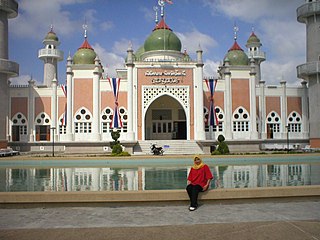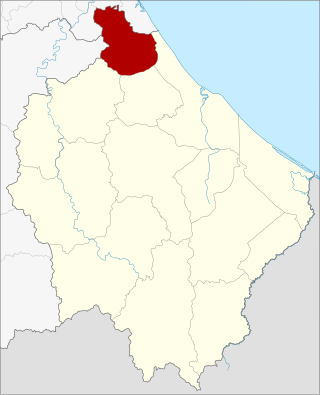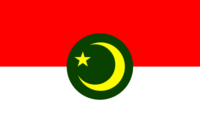
Pattani is one of the southern provinces of Thailand. Neighboring provinces are Narathiwat, Yala, and Songkhla. Its capital is the town of Pattani.

Narathiwat is one of the southern provinces (changwat) of Thailand. Neighboring provinces are Yala and Pattani. To the south it borders the Malaysian state of Kelantan and Perak. The southern railway line ends in this province, which is one of the nation's four provinces that border Malaysia. The province features a range of cultures as well as natural resources, and is relatively fertile. Narathiwat is about 1,140 kilometers south of Bangkok and has an area of 4,475 km2 (1,728 sq mi). Seventy-five percent of the area is jungle and mountains and has a tropical climate.

Yala is the southernmost Province (changwat) of Thailand. Neighboring provinces are Songkhla, Pattani, and Narathiwat. Yala is one of two landlocked provinces in southern Thailand, the other being Phatthalung. Its southern part borders Kedah and Perak of Malaysia.

Hat Yai is a city in southern Thailand near the Malaysian border and the fifth largest city in Thailand. It is 946 km (588 mi) south of Bangkok, has a population of 156,802 (2019) in the city municipality itself and an urban population of 404,044 (2021) in the entire district of Amphoe Hat Yai.

PataniDarussalam is a historical region and sultanate in the Malay peninsula. It includes the southern Thai provinces of Pattani, Yala (Jala), Narathiwat (Menara), and parts of Songkhla (Singgora). Its capital was the town of Patani.

The South Thailand insurgency is an ongoing conflict centered in southern Thailand. It originated in 1948 as an ethnic and religious separatist insurgency in the historical Malay Patani Region, made up of the three southernmost provinces of Thailand and parts of a fourth, but has become more complex and increasingly violent since the early 2000s from drug cartels, oil smuggling networks, and sometimes pirate raids.
The Islamic Liberation Front of Patani, until 1986 known as the National Liberation Front of Patani is a militant Islamic separatist movement based in northern Malaysia and with a history of operations in the South Thailand insurgency.

The Patani United Liberation Organisation is a separatist insurgent group in Thailand, calling for an independent Patani. It was founded in 1968 in Saudi Arabia. This organization composed the national anthem of Patani called Lagu Kebangsaan Patani.

Bersatu, also referred to as the Patani Malays People's Consultative Council was an umbrella group of separatist organisations of the predominantly Muslim and Malay provinces of Southern Thailand ("Patani").

Thai Malays, with officially recognised terms including 'Malayu-descended Thais' and 'Malay', is a term used to refer to ethnic Malay citizens of Thailand, the sixth largest ethnic group in Thailand. Thailand is home to the third largest ethnic Malay population after Malaysia and Indonesia and most Malays are concentrated in the Southern provinces of Narathiwat, Pattani, Yala, Songkhla, and Satun. Phuket Ranong, and Trang home to a sizeable Muslim population, also have many people who are of Malay descent. A sizeable community also exists in Thailand's capital Bangkok, having descended from migrants or deportees who were relocated from the South from the 13th century onwards.

Krue Se Mosque also called Gresik Mosque, Pitu Krue-ban Mosque or Sultan Muzaffar Shah Mosque, is a mosque in Pattani Province, Thailand. Its construction may have begun in the 16th century. The surviving structure is described as having a mixture of Middle Eastern or European architectural styles.
The Kumpulan Mujahidin Malaysia (KMM), or Malaysian Mujahideen Movement, is/was a terrorist organisation that supported an overthrow of the Mahathir government and is/was for the creation of a pan-regional Islamic state comprising southern Thailand, the entirety of Indonesia, and the southern Philippines. It is believed to be self-financing and is often tied in correlation to smaller more extremist groups in Southeast Asia. The KMM is often cited as being associated with the Jemaah Islamiyah or JI. The Malaysian government, which is actively fighting against the Malaysian Mujahideen Movement, has arrested anywhere from 70 to 80 terrorists. The government currently has 48 members in total detained.
The Pattani Islamic Mujahideen Movement is an Islamic insurgent movement that has carried out violent actions as part of the protracted insurgency in Southern Thailand.
The Runda Kumpulan Kecil is a militant Islamic insurgent group operating in Southern Thailand.
This article lists a chronology of events in the South Thailand insurgency from the 1960s. Most take place in the Muslim-majority, contested provinces of Narathiwat, Pattani, and Yala in the far south of Thailand bordering Muslim Malaysia.

On 9 May 2017, two bombs exploded at a Big C supermarket in Pattani, Thailand. Some 80 people were confirmed injured, some seriously and no deaths were reported. Most of the wounded received treatment at the scene, but 21 people were taken to hospital with serious injuries.

The 15th Infantry Division (พล.ร.๑๕.) is an infantry division of the Royal Thai Army, it is currently a part of the Fourth Army Area. The unit is composed of the 151st Infantry Regiment, 152nd Infantry Regiment and 153rd Infantry Regiment and Service Support Regiment. The division engaged in the South Thailand insurgency.

The Battle of Bacho was a battle during the South Thailand insurgency between forces of the Royal Thai Army and RKK insurgents, which began when the latter attacked a military base in Bacho District, Narathiwat Province on 13 February 2013. At least 16 RKK insurgents, including a commander, were killed while none of the Thai military defenders of the base were injured.














